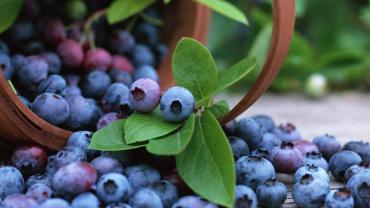
Bilberry: cousin of the blueberry cranberry and huckleberry just not as well known. And like its berry relatives bilberry contains phytochemical compounds that hold promise for supporting particular health conditions.
Bilberries resemble North American blueberries and have a similar flavor. Like other boldly colored berries bilberries owe their black/purple pigment to anthocyanosides which help support blood vessel integrity and may improve circulation. These compounds also reduce platelet aggregation potentially helping to reduce the risk of blood clots. The anthocyanidins in bilberries have antioxidant function and are responsible for one of bilberries’ most common therapeutic applications: supporting healthy vision. Specifically these phytochemicals boost the production of rhodopsin which improves night vision and facilitates the eyes’ adaptations to changing light. Legend has it that this particular property of bilberries was discovered during World War II when British pilots noticed improvement in their night vision after consuming bilberry jam.
Long-term bilberry supplementation (oral capsules; six months or more) was shown to result in small but significant improvements in visual acuity in subjects with normal-tension glaucoma. Bilberry may be beneficial for patients with glaucoma or cataracts. Increased ocular pressure is a frequent finding in glaucoma as is poor circulation in general. Patients with cataracts or glaucoma are often found to have compromised antioxidant defense systems as well. Bilberry could be instrumental for ameliorating both of these situations: the antioxidants in bilberry are potent free radical scavengers and the blood-thinning effects may result in reduced intraocular pressure and improved overall circulation. Individual polyphenols in bilberry had a dose-dependent inhibitory function on angiotensin-converting enzyme (ACE) in cultured human endothelial cells from umbilical veins.
Age-related macular degeneration is another application for which bilberry may be beneficial. Supplementation with bilberry extract (20mg/kg body weight) for three months in senescence-accelerated rats with early senile cataracts and macular degeneration resulted in complete prevention of impairments to the lens and retina compared to 70% of control rats who developed more severe cataracts and macular degeneration.
Eye health may be compromised over the long term by exposure to ultraviolet A light (UVA). Cultured mouse photoreceptor cells treated with bilberry extract improved cell viability and protected against UVA-induced retinal damage. Bilberry extract also protected the same type of cells from damage induced by blue LED lights mainly by suppressing the generation of reactive oxygen species and regulating apoptosis and NF-κB inflammatory signaling. Additionally the antioxidative properties of bilberry anthocyanosides offered neuroprotection against retinal damage in mice in vivo. Free radical generation and chemically-induced neurotoxicity were reduced as was lipid peroxidation in the mouse forebrain.
To be fair study results examining the effects of bilberry on night vision are mixed. This may be due to poor study design insufficient doses or extracts prepared from geographically distinct sources which may have had lower concentrations of the bioactive anthocyanosides. Nevertheless bilberry may be a useful addition to the supplement regimens of patients with degenerative eye conditions or those who simply want to protect their ocular health.
Considering the severe complications wrought by diabetes upon eye health it’s worth noting that bilberry exerts blood glucose-lowering effects on animal models of diabetes. Bilberry may inhibit alpha-glucosidase a starch- and disaccharide-digesting enzyme and also may increase insulin secretion and expression of GLUT 4 (insulin-sensitive glucose transporters) in skeletal tissue and lower hepatic gluconeogenesis. The potent antioxidant and anti-inflammatory properties of bilberry may also play a role in protecting against some of the downstream effects of hyperglycemia. Unfortunately equally impressive effects have not been demonstrated in humans.
Owing to bilberry’s effects on blood thinning and vasorelaxation patients on blood-thinning medication and those with low blood pressure should use caution and work with their healthcare practitioners when using bilberry supplements. Bilberry is also contraindicated during pregnancy and breastfeeding.